October 2021

October 2021
In the early days, the e-book only complemented the paper book. However, the e-book has gradually become a substitute for the existing culture of reading as electronic devices become more common. Bookclub Millie, an e-book platform in Korea, leads this trend.
Written by
Yu Pureum
Photo courtesy of
Bookclub Millie

It is an era full of content. To a generation used to instant information and entertainment, the book is relatively less sensational and interesting. Branden Do, team leader of the reading life team of Bookclub Millie, said, “We are working on creating extensive opportunities and content for a generation that perceives reading as somewhat boring and irrelevant so they see it as a new lifestyle that adds value to their daily lives.”
As per this philosophy, Do is creating extensive content to promote reading on a daily basis. One of them is the internet feed, “Today’s Book.” “Today’s Book” introduces books on the events of the day, as well as user recommendations. For example, on Sept. 1―when World War II broke out―the feed posted The Ultimate Experience: Battlefield Revelations and the Making of Modern War Culture by Yuval Harari.
The UI and UX are being developed in a reader-friendly direction, too. As well letting users enjoy customized e-books by selecting fonts, text spacing and background color according to their personal preferences, the platform was the first in Korea to adopt the gaze tracking function. “The gaze tracking function turns the page automatically by tracking eye movement," said Do. "Two free hands enable multitasking, creating an even more intuitive and convenient digital reading environment.”
Above all, Bookclub Millie’s subscription system―Korea’s first―fostered an environment where novice readers can grow closer to the pursuit. The system has greatly mitigated the concern many book buyers have, namely, whether they can finish what they purchase. If you think a book looks interesting, try reading it for a bit. If it doesn’t meet expectations, download another book. That’s it.
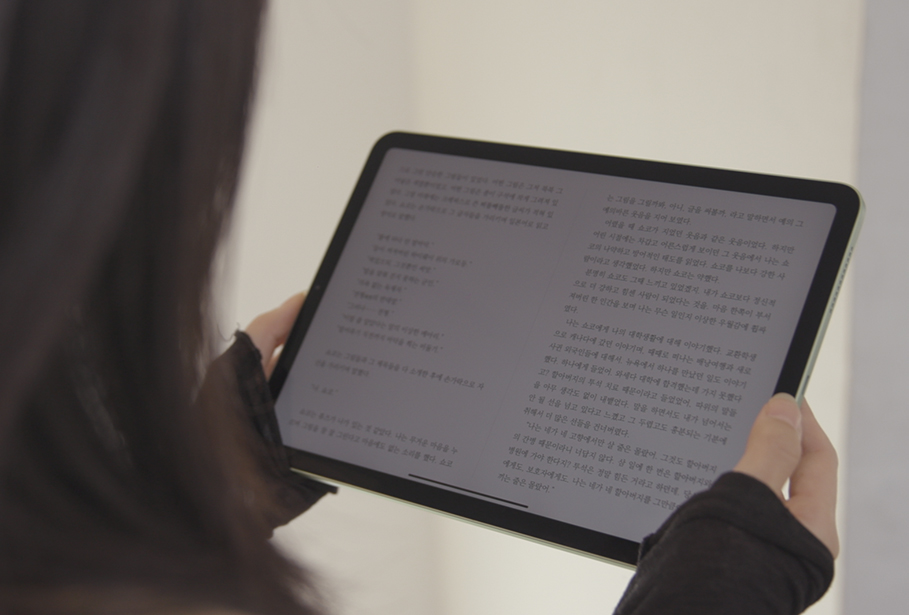 Customized screens, eye tracking and other technologies are improving the reading experience.
Customized screens, eye tracking and other technologies are improving the reading experience.
 E-books are creating a more independent reading culture.
E-books are creating a more independent reading culture.
The merit of digital platforms is that they have no limitations of space or time. Thanks to this, reading―formerly a personal hobby―is becoming a communal, sharable activity. “We pursue active communication between members,” said Do. “Last year, participating members created the program, ‘This Book in This Case.’ When a member shares his or her story, other members recommend some relevant books. The response was highly positive, so it has become a main feature of Bookclub Millie, and it became an official radio program beloved by listeners.”
The “Library” function is also contributing to a communal culture of reading. All users have their own libraries, organizing books according to their interests. “By following the libraries of other members whose taste in books is similar to yours―or even the libraries of celebrities―you can check their recently read books, recommended books or book reviews,” said Do. You can also share your thoughts with a one-line emotional tag. We are working on extensive content so that Bookclub Millie can become a platform of communication based on books in the future, too.”
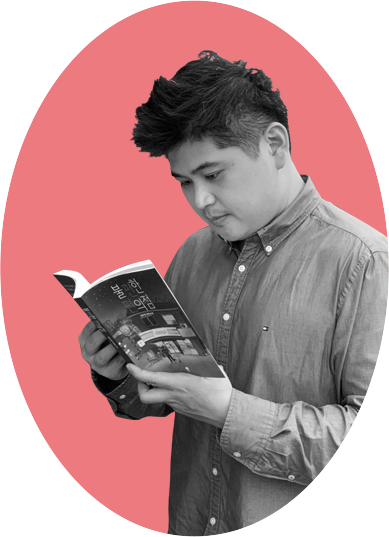
Team Leader
Branden Do
Q. What kind of culture of reading do you pursue?
I think all the activities that make our daily lives more valuable through books can be considered reading. I pursue a culture of reading that is closely tied to our daily lives. You probably think only reading a book while sitting down in the proper position constitutes reading, but I believe that even asking someone which book has influenced him can be considered reading.
Q. How does it reflect Korea’s recent reading trends?
Recently, there have been diverse, ceaseless attempts to lower the entry barrier to reading. To convert vague curiosity of reading to actual reading, I believe you need to make the provision of content interesting. So we have been providing new reading formats such as audiobooks and chat-books, as well as e-books. Moreover, by extending collaboration, we are trying to let users experience reading on mobile devices, communication products and in vehicles.
Q. What kind of services are available that emphasize the characteristics of the e-book platform?
Since December of last year, we have been providing a “Complete Reading Index” for all books on the service. The index is composed of the probability of finishing a book and the expected time to finish it. It is a statistical value based on the big data of members. We can check how many members actually finished reading a book and how long it took to finish it. The index is a valuable data point for readers, authors and publishers. An author recently promoted his book by exploiting the index, posting it on social media. Readers can also discover previously unknown books through the index. From this phenomenon, I believe that the index can become the foundation of a new reading trend.
Audiobooks are continuously evolving. By replacing dry electromechanical sounds with more natural AI voices, audiobooks became much more pleasant to listen to. They are covering more and more fields by the day, too. Audiobook platform Welaaa is receiving favorable reviews with its immersive audiobooks, which capture both emotion and atmosphere. The unrevealed efforts of one audiobook editor are largely to thank for this.
![]()
Written by
Lee Jisung
Photographed by
Welaaa
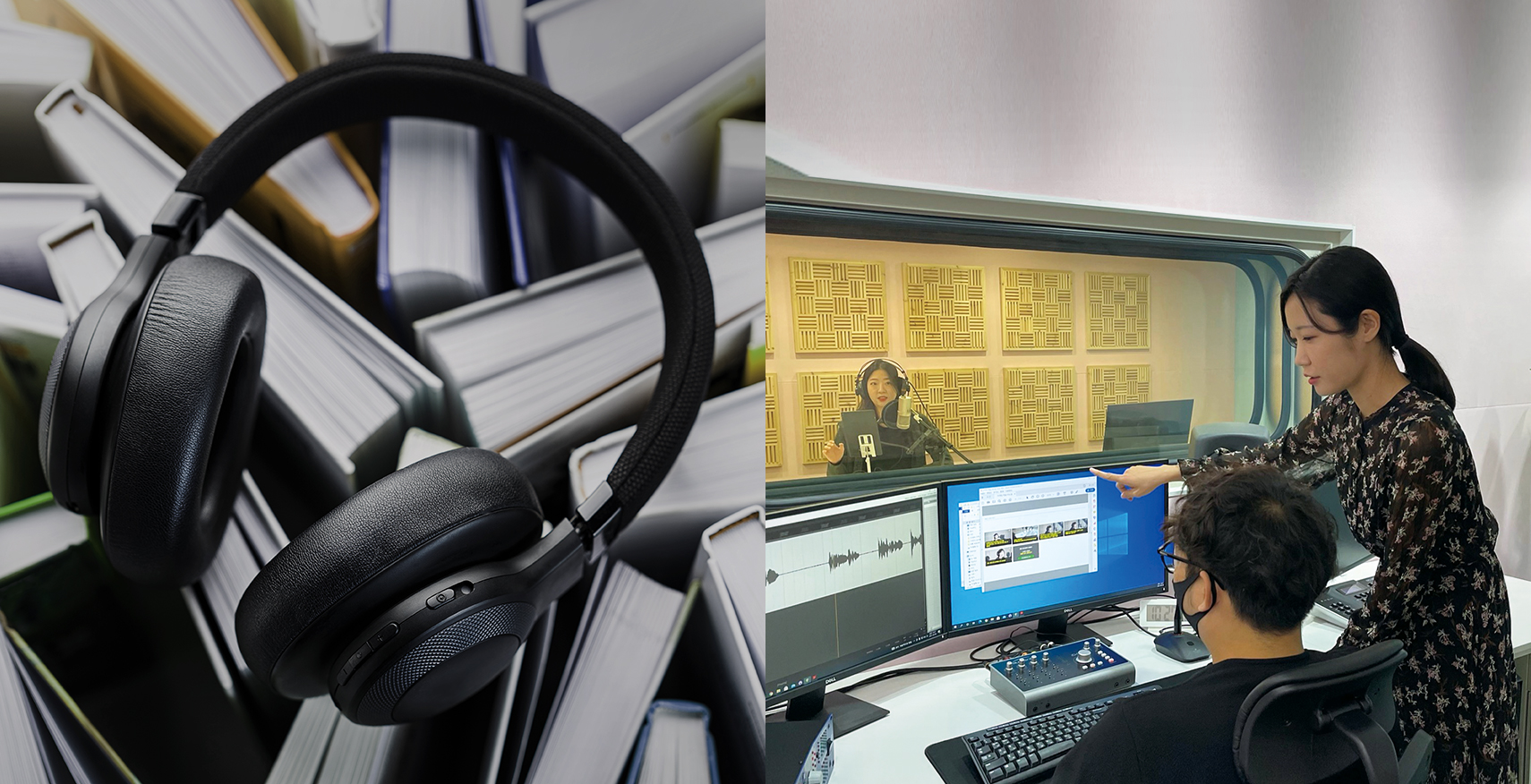 © shutterstock
© shutterstock
Audiobooks have rewritten the paradigm of books as merely “reading” objects. Occasional animosity notwithstanding, the audiobook is gradually taking its position as a new book format. As the number of audiobook users increases, the demand for improved quality also increases. Making a book which is better listened to than read by reflecting these demands―that is the mission of an audiobook editor.
With audiobooks, simply reading is not enough. As an audiobook has an auditory aspect, you need to refine the content so that it can be understood by listening. The audiobook editor is responsible for this process.
Kim Eun Seon, the audiobook editor of Welaaa, said, “The audiobook editor works on editing the script, which is the basis of the audiobook, to make it fit for the audiobook. And on finding suitable voice actors.” “Audiobook editor” is still an unfamiliar profession to many people. How did Kim start her career?
“I started my career as a broadcast writer at a liberal arts broadcasting station,” she said. “Making knowledge content for the public was quite fun. As the times changed, there emerged a new form of content called the audiobook, which combined the book with the concept of digitization. I thought that it would be possible to deliver knowledge to the public in a more interesting way through audiobooks, so I chose a career as an audiobook editor.”
While working as an audiobook editor, Kim is continuously discovering the charms of the audiobook format. “If reading a book is to be done by oneself, I think listening to a book is to be done together,” she says. “If you listen to an audiobook with the thought that you are communicating with a voice actor as well as the author of the book, the experience will be more entertaining.”
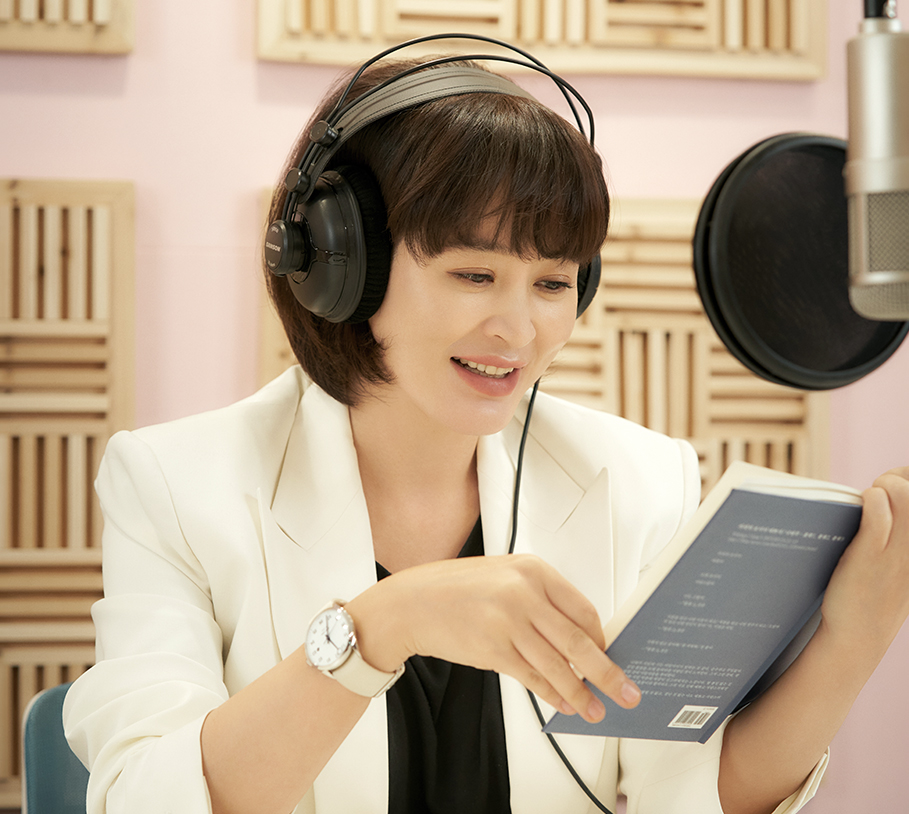 Voice actors, editors and producers work hard to bring an audiobook to life.
Voice actors, editors and producers work hard to bring an audiobook to life.
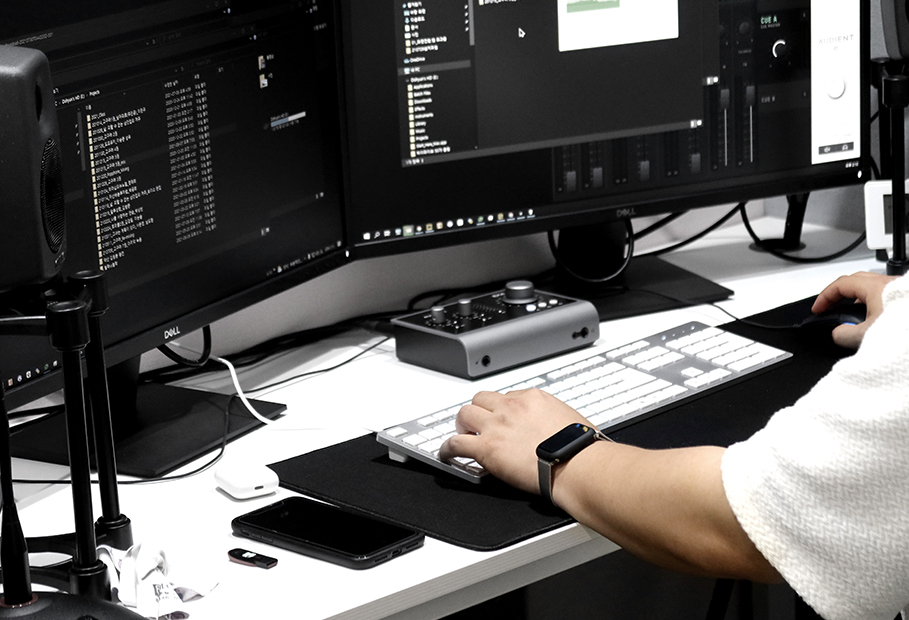
The audiobook editor is responsible for giving life to a book from editing the manuscript to writing the script for reading and recruiting voice actors. When the voice of an actor is added, the content of the written word changes stereoscopically. With a more solid rough sketch, the producer can create a more stereoscopic audiobook.
Interpreting a picture or graph and adding adequate sound effects are also tasks for the audiobook editor. “Sounds effects which help listeners imagine the situation are occasionally added,” she says. “We use sound effects such as everyday ambience, including noise in the subway or cafe, or the battlefield sounds of swords, spears and arrows in historical novels.”
On the other hand, casting a voice actor whose voice is in harmony with the book is the top priority. She says, “Even the best voice can have an adverse effect if the voice is not in harmony with the content of the book to be made into an audiobook.“
Creating an audiobook takes a month on average. Therefore, both affection for the book and a sense of responsibility for the book’s content are essential for the audiobook editor. Moreover, they need an ability to tell a story so that listeners can understand the content easily, viewing the content from the public’s perspective. “I will continuously build up my capabilities to make an audiobook to help people become closer to reading.”

Audiobook Editor
Kim Eun Seon
Q. How do you record a dialect or a foreign language?
The North Korean dialect and the accent of an overseas Korean can be handled as professional voice actors can act very well. But, recording heavy regional accents is not easy. It is difficult even with acting skills. We recently had difficulty in recruiting voice actors since the characters in the novel, which another editor was working on, were using the dialect of southwest Korea. We searched for voice actors who can speak the dialect by asking voice actors and engineers we know. Then, we barely managed to recruit the group of voice actors by checking the hometown of the actors one by one on the Internet. Recording a foreign language is similar.
Q. Out of the audiobooks which you have edited, which one was the most memorable one and why?
The Goguryeo series by the author Kim Jin-myung. I can still remember it as I had a marvelous experience, which was like breathing life into the book through the voices of the actors at the recording site. Also, it was my first feature-length series. Although I had a lot to worry about for a long time, I felt proud when I read some feedback from users who enjoyed listening to the book after its release.
Q. What is the book culture you want to build through the audiobook?
I hope the barrier to books can be lowered. Even with numerous recommendations from people around you, reading a book is hard to start if you feel a sense of detachment or burden. To promote the pleasure books provide, I think the most important thing is to lower psychological barriers and increase accessibility. I hope the audiobook will be helpful in this regard.